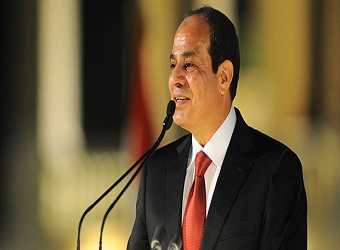Sisi said Egypt was among the first countries to contribute to peacekeeping missions, adding that a new strategic approach must include a comprehensive, pragmatic plan and by the international community to resolve conflicts rather than “manage” them.
The Security Council meeting was held to discuss reforms to peacekeeping missions, with the council unanimously adopting resolution 2378/2017, which introduces reforms to peacekeeping missions worldwide.
The resolution– which aims to enhance accountability, transparency, and efficiency in carrying out peacekeeping missions– was put forward by Ethiopian Prime Minister Hailemariam Desalegn.
“I welcome the passing of the resolution on peacekeeping mission reform,” Sisi said, describing the measure as the “right step by the UN to boost peace and security.”
“Despite the importance of peacekeeping as one of the main tools of the international community in maintaining peace and security, it does not have to be the only means of achieving such a goal,” Sisi said, stressing that “peacekeeping is not an alternative to diplomatic or mediation efforts that aim to solve the root of problems.”
El-Sisi said that peacekeeping missions cannot be the first reaction to every crisis, stressing that Egypt has been keen throughout the past three years to adopt an institutionalised multilateral consultative mechanism when it comes to the peacekeeping missions.
“The responsibility to protect civilians falls on everyone,” Sisi said.
He also stressed the importance of the UN’s role in supporting regional organisations like the Arab League.
“Egypt will continue to carry out its regional role in reaching and preserving peace as well as combating terrorism,” Sisi said.
The Egyptian president also participated in a Security Council session on Libya, stressing that Egypt will continue to support efforts to enhance the abilities of the Libyan National Army.
“Egypt will be among the top countries supporting efforts at the UN to reach a comprehensive settlement in Libya,” Sisi said, accentuating the need to reach the settlement before the transitional period outlined by the 2015 Skhirat agreement ends on 17 December.
“I would like to highlight the success of a meeting held in Cairo on Sunday that saw agreement between Libyan army officials on the importance of supporting the unity of the Libyan National Army so it can carry out its duties to preserve the Libyan state and its legitimate institutions,” Sisi said.
According to El-Sisi, the meeting in Cairo between Egyptian and Libyan officials resulted in an agreement to establish a committee that will meet soon to discuss further steps related to the formation of a unified Libyan army.
The comments by the president come two days after the Egyptian military announced that Egypt will be point country in the formation of a Libyan army.
The Sunday meeting, which was headed by Egyptian army Chief-of-Staff Mahmoud Hegazi, discussed the obstacles over the past seven years to the development and unity of the Libyan army.
Officials also stressed during the meeting the importance of supporting a political solution as a cornerstone to achieving security and stability in the North African country.
During his speech, Sisi said that reaching a solution in Libya would save the country from falling into a “political and security vacuum.”
“The aim of the comprehensive reconciliation is to address the outstanding issues in the Libyan political agreement and the establishment of a legal and constitutional framework… [to manage] the transitional period ahead of presidential and parliamentary elections in 2018,” El-Sisi said.
Since late 2016, Egypt has been hosting a series of negotiations in Cairo, mediated by Hegazi, between the rival Libyan factions. Egypt has consistently stressed during these meetings the need for a political consensus to end the country’s civil conflict.
Source: Ahram online


